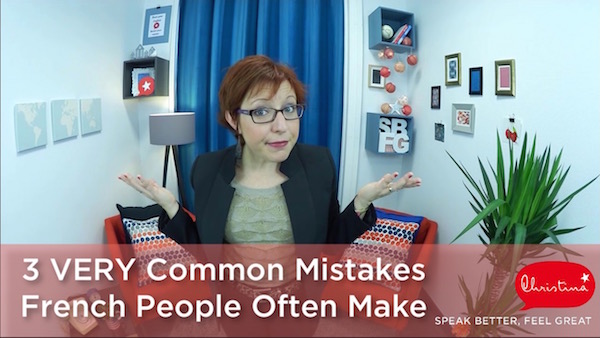
“Do I need to use ‘since’ or ‘for’”?
“I know not to use ‘propose’, but what can I say instead?”
“Do I need present continuous or present perfect continuous tense here?”
If you sometimes have doubts about your grammar structures, there’s a good chance (il y a de fortes chances) that you’ve asked yourself these questions at some point (à un moment ou un autre).
While it’s important to just be able to communicate the message in English, we also want to use correct structures and avoid common mistakes in English (erreurs fréquentes en anglais). At the same time, we don’t want to hesitate too much while thinking about how to formulate them.
We want it to be automatic.
Do you feel like you make basic mistakes in English?
Even when I speak French sometimes, I still ask myself little questions (je me pose toujours des petites questions) like this. Should I say “Je t’ai dit” or “Je t’avais dit”? It’s frustrating because I feel that with my level of French, I shouldn’t be making these mistakes. I need a micro-correction for some basics, to correct them once and for all (une bonne fois pour toute).
If you feel like you make basic mistakes in English (erreurs fréquentes en anglais), even though your level is pretty good, today’s SBFG TV episode is for you.
You’ll get some laser-focused corrections (des corrections hyper-pointues) of some VERY common structures in English. Structures that I’m sure you use often.
Once you’ve watched this episode, let me know your answer to this question:
What other structures in English do you have questions about?
Ask your questions in the comments section. Someone in the SBFG Community will surely be able to help you. Remember there are no stupid questions. After 11 years of living in France, I still have to ask if “structure”, “magazine”, and “bâtiment” are masculine or feminine!
Remember that thousands of French professionals visit this site to learn, explore and reach their career goals. Your contribution may be exactly what someone else needs to make their English a little more perfect.
If you found this episode helpful, please pass this along to your closest colleagues, clients and friends — anyone you think could use some support as they boost their English and their career.
Thanks so much for making this one of the most supportive places for French professionals improving their English.
Have a fantastic week in English,
Christina





There’s good chance = il y a DE forteS chances (au pluriel).
Hah, thanks Christel for pointing that out! Maybe I should find some videos to help Americans with the grammar rules of singular/plural and adjective agreement! I’ll fix it right away! Thanks 🙂